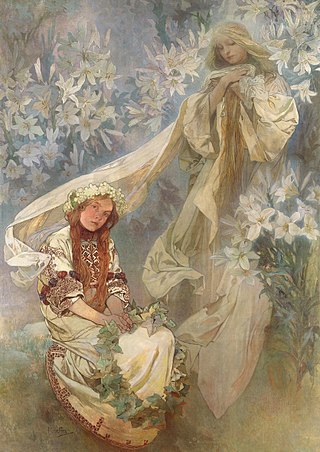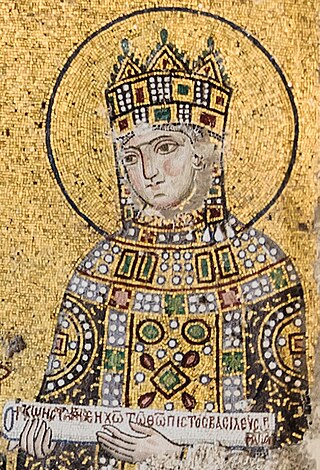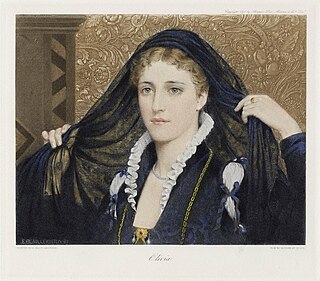
Chloe, also spelled Chloë, Chlöe, or Chloé, is a feminine name meaning "blooming" or "fertility" in Greek. The name ultimately derives, through Greek, from the Proto-Indo-European root *ǵʰelh₃-, which relates to the colors yellow and green. The common scientific prefix chloro- derives from the same Greek root. In Greek the word refers to the young, green foliage or shoots of plants in spring.
Betty or Bettie is a name, a common diminutive for the names Bethany and Elizabeth. In Latin America, it is also a common diminutive for the given name Beatriz, the Spanish and Portuguese form of the Latin name Beatrix and the English name Beatrice. In the 17th and 18th centuries, it was more often a diminutive of Bethia.
Amy is an English feminine given name, the English version of the French Aimée, which means beloved. It was used as a diminutive of the Latin name Amata, a name derived from the passive participle of amare, “to love”. The name has been in use in the Anglosphere since the Middle Ages. It was among the 50 most popular names for girls in England between 1538 and 1700. It was popularized in the 19th century in the Anglosphere by a character in Sir Walter Scott's 1821 novel Kenilworth, which was based on the story of Amy Robsart. Enslaved Black women in the United States prior to the American Civil War were more likely to bear the name than white American women because slave masters often chose their names from literary sources. The name declined in use after 1880 but was revived due to the hit song Once in Love with Amy from the 1948 Broadway musical Where's Charley?. The name peaked in usage in the United States between 1973 and 1976, when it was among the five most popular names for American girls. It remained among the top 250 names for American girls in the early 2020s.

Bianca is a feminine given name. It means "white" and is an Italian cognate of Blanche. It is known in the Anglosphere as a character in William Shakespeare's The Taming of the Shrew. It came to greater notice in the 1970s, due to public figures such as Bianca Jagger.
Libby as a feminine given name is typically a diminutive form of Elizabeth, which is less commonly spelled 'Libbie' or 'Libi'.
Natasha is a name of Russian origin. It is the diminutive form of the Latin name Natalia, which means "born on Christmas Day".
Teresa is a feminine given name.

Ethel is an Old English word meaning "noble", today often used as a feminine given name.

Yasmin is usually a feminine given name, sometimes also a surname. Variant forms and spellings include Yasaman, Yasemin, Yasmeen, Yasmina, Yasmine, and Yassmin.

Samantha is a feminine given name.
Vicky, Vick, Vickie or Vicki is a feminine given name, often a hypocorism of Victoria. The feminine name Vicky in Greece comes from the name Vasiliki.
Vivian is a given name, and less often a surname, derived from a Latin name of the Roman Empire period, masculine Vivianus and feminine Viviana, which survived into modern use because it is the name of two early Christian female martyrs as well as of a male saint and bishop.
Lindsay is both a Scottish surname and a given name. The given name comes from the Scottish surname and clan name, which comes from the toponym Lindsey, which in turn comes from the Old English toponym Lindesege for the city of Lincoln, in which Lind is the original Brittonic form of the name of Lincoln and island refers to Lincoln being an island in the surrounding fenland. Lindum Colonia was the Roman name of the settlement which is now the City of Lincoln in Lincolnshire. Lindum was a Latinized form of a native Brittonic name which has been reconstructed as *Lindon, which means "pool" or "lake" and refers to the Brayford Pool.
Cassie is a feminine given name and a short form of various other given names Cassandra, Cassandro, and Cassidy mostly used in English-speaking countries. It is more rarely a surname. People and fictional characters named Cassie include:

Angela is a female given name. It is derived from the Greek word ángelos (ἄγγελος), meaning angel from Greek belief systems. In the United States, the name "Angela" was at its most popular between 1965 and 1979, when it was ranked among the top 10 names for girls. Between 1922 and 2021, in the United States, the name was ranked in the top 35 names for girls.
Rosie is a feminine given name of English origin. It is a diminutive form of the English language given name Rose, which is of Latin origin. Similar diminutives in other languages include: Rosa becoming Rosita in Spanish, and Ruža becoming Ružica in Slavic languages. Rosie is a nickname for names such as Rosalie, Rosemary, Roseanne, Rosalyn, Rosanna, and more. It is occasionally a male nickname, primarily a short form of Roosevelt.

Lily is a feminine given name usually derived from lily, the flower. The name became particularly popular along with other flower names for girls during the 1800s and early 1900s. The lily also has associations with and has been symbolic of innocence and purity in Christian art. Names beginning with or containing the letter L have also been particularly fashionable for girls. It is also occasionally used as a diminutive for other names such as Elizabeth.

Zoe, Zoey, Zoie, Zoi, Zoé or Zoë is a female first name of Greek origin, meaning "life". It is a popular name for girls in many countries, ranking among the top 100 names for girls born in the United States since 2000. It is also well used in other English-speaking countries including Australia, Canada, Ireland, New Zealand, and the United Kingdom, as well as in other countries including Argentina, Belgium, Czech Republic, France, Hungary, Italy, Mexico, Netherlands, Spain, and Switzerland. In 2022, Zoe was the 20th most popular name given to girls in Canada, while Zoey was 42nd.

Tiffany is a primarily English feminine form of the Greek given name Theophania. It was formerly often given to children born on the feast of Theophania, that is, Epiphany. The equivalent Greek male name is Theophanes (Θεοφάνης), commonly shortened to Phanis (Φάνης) and the female is Theophania (Θεοφανία) or Theophano (Θεοφανώ), colloquially Phani (Φανή).

Olivia is a feminine given name in the English language. It is derived from Latin oliva, olive. Both Oliva and Olivia were Latinate forms in use in English-speaking countries as early as the 13th century. Olive was in common use as a vernacular form. Though not invented by William Shakespeare, the name was popularized by a character in Twelfth Night.









